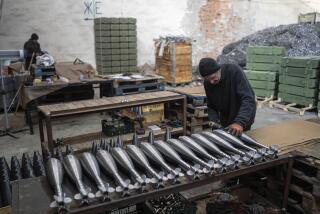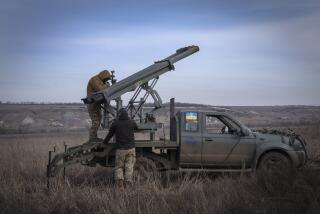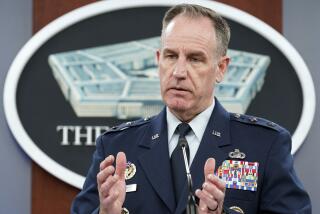Equipment shortages hamper Iraqi military in some regions
mosul, iraq -- Although Washington has made the readiness of Iraqi forces a key benchmark of progress, the Baghdad government is still failing to supply Iraqi commanders in this northern city with adequate equipment to go it alone, U.S. commanders say.
Equipment shortages are a major concern in Mosul and other areas as U.S. offensives in Anbar province in the west and belts of cities surrounding Baghdad drive Al Qaeda in Iraq fighters and other militants north.
“Bottom line, things are just not getting here,” said Lt. Col. Stephen Twitty, commander of the 4th Brigade Combat Team, 1st Cavalry Division.
Twitty said Iraqi security forces in Mosul are among the most active and independent in the country, patrolling neighborhoods and coordinating their own raids and searches. They operate with the support of a single U.S. battalion, compared with 11 a year and a half ago and 27 in Baghdad, the military said.
But Twitty said Iraq’s Defense and Interior ministries have failed to supply Iraqi commanders with much-needed equipment for their missions -- the armored trucks, attack helicopters and bomb-detecting robots that U.S. forces have trained them to use.
U.S. soldiers have been supplying Iraqi security forces with spare parts and helping them repair vehicles, Twitty said, but they can’t provide them with the new vehicles, medical supplies, weapons and engineering technology they need.
Prime Minister Nouri Maliki and the ministries have promised to better equip the country’s security forces by the time Twitty is scheduled to hand over his command in January, but he and other U.S. commanders said they have seen little change in recent months.
“Progress, in my opinion, remains too slow,” Twitty said.
As U.S. forces try to reduce their presence in the region, they will have to leave more specialists behind to support the Iraqis unless the Iraqi government supplies security forces now, Twitty said.
U.S. officials have been pressuring the Iraqi government to better arm its troops amid signs of a deterioration in Iraqi readiness. Recent reports show fewer Iraqi security forces capable of fighting independently: about nine Iraqi army divisions, according to a White House assessment this month, compared with 10 in a May assessment by Marine Gen. Peter Pace, chairman of the Joint Chiefs of Staff.
Walking through one of Mosul’s downtown markets with Twitty and Iraqi police officers last month, near throngs of shoppers and merchants milling between stalls and ancient ruins, police Sgt. Maj. Whathiq Mohammed Abdulqadr Hamdani said he was trying to fight insurgents with inferior firepower. He pointed across the Tigris River, where he said Iraqi police and soldiers were conducting a security operation.
“We need to fight the insurgents with the bigger guns,” he said, pointing again, this time across the street to a BKC machine gun atop one of his police trucks. He wants to replace the BKC with a bigger .50-caliber machine gun and add armor to the truck.
“If we got our equipment, we would get our independence -- not just to attack, but to build the country,” he said.
Soon after, Twitty visited the Iraqi Army 2nd Brigade headquarters, where Staff Col. Taha Asker Mathlum also said he needed equipment, especially the technology to detect roadside bombs and jam radio signals. He requested new equipment from the central government 10 months ago, he said, but had not received a response.
As Iraqi forces have taken the lead in more offensives in the last three months, they have seen casualties rise to 232 in July from 91 in January, according to the website icasualties.org.
The risks of serving and the lack of sophisticated equipment for jobs such as detecting roadside bombs have made it difficult to maintain skilled soldiers, Mathlum said.
U.S. commanders in Baghdad are unlikely to pressure the Iraqi government to send new equipment to Mosul.
Rear Adm. Mark Fox said he’d heard about shortages in recent months, but that the focus of the military buildup was U.S. troop levels in Baghdad, not equipping Iraqis in the provinces.
Iraqi security forces have “the basics,” he said: vehicles and weapons.
“They’ve got what they need,” he said.
But Twitty said Iraqi and U.S. leaders can’t ignore equipment shortages that weaken Iraqi leaders’ commands. To do so, he said, would slight commanders such as Mathlum and Hamdani, who stood their ground against insurgents while others fled, and developed a skilled security force.
“You’ve got to give them the equipment that they want,” Twitty said.
--
molly.hennessy-fiske @latimes.com
More to Read
Sign up for Essential California
The most important California stories and recommendations in your inbox every morning.
You may occasionally receive promotional content from the Los Angeles Times.











